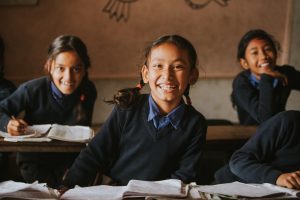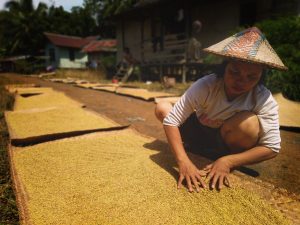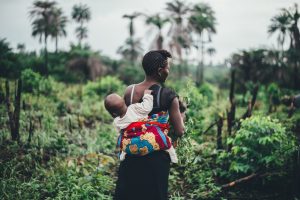Gender Equality: A No-Regrets Solution to Climate Change
By Kailyn Klotz, guest blogger

Photo By Jonny Mansfield on Unsplash
The conversation around the state of our global climate tends to be one that instills fear and dread, negativity and despair. While the media is finally beginning to acknowledge climate change as a major problem worldwide, headlines that read “Twelve More Years Until Climate Catastrophe” and “Reaching End Game” suggest we’re too late and had better buckle our seatbelts for the forthcoming devastation.
Not so fast! Project Drawdown, a research non-profit based in nearby Sausalito, is working hard to change the negative discourse surrounding climate change by providing real-life solutions that have the best potential to reverse global warming. As stated on the Project’s website, these solutions “shift the conversation from ‘doom and gloom’ defeatism to one of possibility, opportunity, action and empowerment.” They help us visualize a world we not only want to live in, but can live in.
Over the summer, the Women’s Environmental Network (WEN) East Bay Book Club read Drawdown: The Most Comprehensible Plan Ever Proposed to Reverse Global Warming — the book written to highlight the Project’s findings.
Drawdown guides the reader through 80 different solutions to achieve zero net carbon emissions and re-sequester carbon already in the atmosphere — all of which we currently have the necessary technology and information to implement. Solutions range from innovations you might expect, like solar farms and electric vehicles, to practices you may know nothing about, such as tree intercropping and refrigerant management.
The solutions presented are categorized into seven sectors — Energy, Food, Buildings and Cities, Land Use, Transport, Materials, and Women and Girls.
That’s right — Women and Girls. We WEN book clubbers were excited too! Although it’s the smallest sector by number of solutions, Drawdown emphasizes that “the solutions (in this sector) focus on the majority of humanity, the 51 percent who are female.” By supporting women we not only make positive advancements on global warming, but also better the lives of over half the global population.
So, What Are the Solutions?
In her 2019 TED Talk, Drawdown senior writer Katharine Wilkinson explains, “If we gain ground on gender equity, we gain ground on global warming.” That’s why women smallholders, educating girls, and family planning have all been dubbed by the Project as “no regrets solutions” that benefit society as well as the environment.
Women smallholders
In low-income countries, smallhold-farming women produce 60 to 80 percent of the food, often on five acres of land or less. Despite women being the primary food producers of our world, such limitations as restricted access to land rights, credit and capital, training, tools, and technology means women yield less than men on the same amount of land.
As Drawdown notes, “According to the Food and Agriculture Organization of the United Nations, if all women smallholders receive equal access to productive resources their farm yields will rise by 20 to 30 percent…One hundred million to 150 million people will no longer be hungry.” And while this is intrinsically great news, it’s also the case that if all farmers – women and men — followed better agricultural and land-use practices it would help reduce carbon emissions through soil retention and avoided deforestation.

Photo by Yohanes Deobi from Pexels
The Project’s research finds that supporting women as smallhold-farmers could reduce 2.1 gigatons of carbon dioxide by 2050. This is similar to the impact household recycling is estimated to have.
Educating girls
While many women living in the US today have seen the benefits of having access to an equitable childhood education, 130 million girls globally are still denied their basic right to attend school. This creates a domino effect of consequences for them, their families, and our earth. As Wilkinson further explains, “Education means better health for [women] their children, financial security, agency at home and society, and the capacity to navigate a climate-changing world.”
More years of education can also lead to women marrying later and having fewer children, resulting in fewer overall emissions.
Family planning
The Project’s researchers have found that “225 million women in lower-income countries say they want the ability to choose whether and when they become pregnant.” Yet lack of accessible contraception results in about 74 million unintended pregnancies every year, burdening not only the welfare of women and children, but also the welfare of our planet.

Photo by Annie Spratt on Unsplash
Similar to the benefits of educating girls, family planning has ripple effects that result in less greenhouse gas emissions. It should be noted that Drawdown also acknowledges that while “each person consumes resources and causes emissions throughout a lifetime, those impacts are much greater for someone in the United States than in Uzbekistan or Uganda.”
WEN book clubbers discussed how topics surrounding women and population can be controversial — we felt that reducing the number of humans on this planet should not be the definitive reason for why girls should be educated or why women should have a say in when and if they become pregnant. In her talk, Wilkinson emphasizes that “curbing the growth of our human population is a side effect.” While it is important to acknowledge that the emission-reduction potential of these two solutions combined is significant — resulting in about 120 gigatons by 2020 — the total return on these investments is incalculable.
Despite the massive impact potential of these solutions, Wilkinson makes clear they’re only part of the answer. “This does not mean that women and girls are responsible for fixing everything,” she says. “Though we probably will.”
Originally from Washington State, Kailyn moved to the Bay Area for a fellowship in UC San Francisco’s Office of Sustainability. Two years later, she specializes in zero waste practices and is helping the City of Hayward navigate the current recycling crisis. Her love for running keeps her in nature, and she is an enthusiastic Adventure Scientist volunteer, combating illegal timber trafficking through Coastal Redwood sampling.

